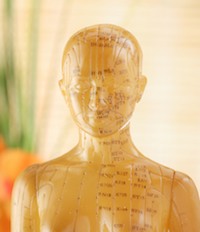Researchers conclude that acupuncture benefits cognition in children with mental retardation.  The research team also found that acupuncture improved social adaptability. In this randomized study, participants were placed in either a medication group or an acupuncture group. The medication did not provide any statistically significant improvements. Acupuncture improved both the intelligence quotient and the social adaptability score.
The research team also found that acupuncture improved social adaptability. In this randomized study, participants were placed in either a medication group or an acupuncture group. The medication did not provide any statistically significant improvements. Acupuncture improved both the intelligence quotient and the social adaptability score.
A total of 60 children with mental retardation were randomly divided into an acupuncture group and a medication group. The acupuncture group received primary acupuncture point stimulation at acupoints Sishencong, GB13, Niesanzhen, GV17 and GB19. The medication group received piracetam tablets. Piracetam is a nootropic drug that is a cyclic derivative of GABA. It is sometimes taken as a cognitive enhancement drug, however, its primary clinical application is for cortical myoclonus. A course of treatment totaled 4 months of either acupuncture or piracetam ingestion. Efficacy was evaluated following a course of treatment using the China-Wechsler Intelligence Scale for Children and the Infant-Junior School Student Social Life Ability Scale.
Piracetam failed to create a significant clinical benefit for the patients. Acupuncture improved the final intelligence quotient, the social adaptability score and the performance intelligence quotient. Neither group made a significant change in the verbal intelligence quotient.
In related research, investigators discovered that acupuncture can “effectively relieve child autism symptoms and enhance the intelligence, language ability and social adaptive ability.” The research documented that age was not a factor. The 4 to 6 years of age group improved and the 2 to 3 years of age group improved similarly. The scalp acupuncture treatment principle used in the study was “regaining the consciousness and opening the orifice.” A similar study concluded that scalp acupuncture combined with language therapy “has a significantly positive effect on language development in children with autism.” In yet another study, 12 acupuncture visits using electro-acupuncture improved functions in children with autism. Electro-acupuncture caused improvements in language comprehension and self-care ability for the children in this randomized, double-blind, sham-controlled, clinical trial of acupuncture for the treatment of autism spectrum disorder (ASD).
References:
Huang, J. B., H. F. Cao, J. Hu, L. H. Liu, Z. Wang, and H. Lin. "Clinical research on children mental retardation treated with acupuncture." Zhongguo zhen jiu= Chinese acupuncture & moxibustion 33, no. 8 (2013): 682.
Zhongguo Zhen Jiu. 2011 Aug;31(8):692-6. Treatment of autism with scalp acupuncture. Li N, Jin BX, Li JL, Liu ZH. Neuro-Rehabilitation Department, Nanhai Women and Children Hospital Affiliated to Guangzhou University of CM, Guangdong, China.
J Altern Complement Med. 2008 Mar;14(2):109-14. Scalp acupuncture effect on language development in children with autism: a pilot study. Allam H, ElDine NG, Helmy G.
Altern Med Rev. 2010 Jul;15(2):136-46. Randomized controlled trial of electro-acupuncture for autism spectrum disorder. Wong VC, Chen WX. Department of Paediatrics and Adolescent Medicine, Queen Mary Hospital, The University of Hong Kong, Hong Kong, China.

